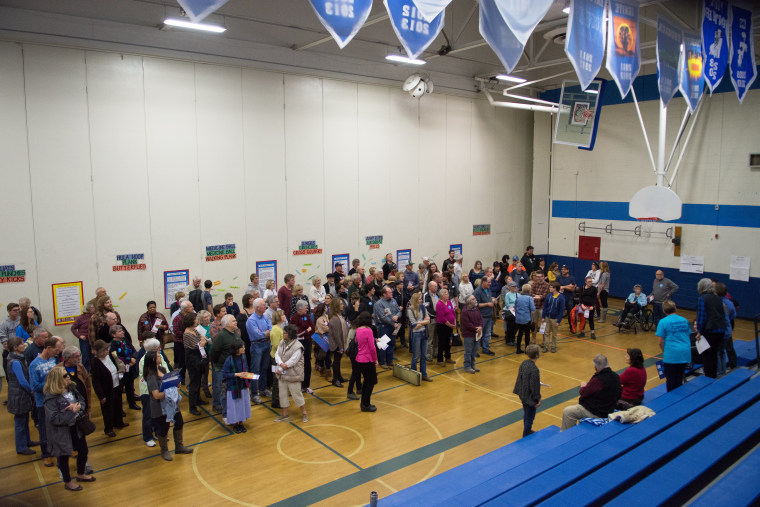What happens in Vegas, does not stay in Vegas. On Saturday, a chaotic Nevada caucus led to a media firestorm involving celebrities and a respected Latina civil rights icon. The dust-up began when Dolores Huerta, a Hillary Clinton supporter, alleged that she had been barred from translating proceedings into Spanish for attendees at a caucus held at Caesar’s Palace; actress America Ferrera tweeted that Huerta, age 85, had been shouted down by Bernie Sanders supporters crying, “English only!” Later actresses Susan Sarandon and Gaby Hoffman, who were also in attendance supporting Sanders, weighed in with their own accounts of what transpired.
While portions of the incident were captured on video, you probably had to be there to know what really happened. One thing is clear: the Nevada caucuses are a mess, and do not serve Latinos or other state residents well.
Yes, as a diverse state Nevada is worthy of playing a decisive role in the presidential nominating process. However, it is essential that the parties get their acts together.
The kindest thing to say about the Nevada caucuses is that they are a work in progress. This may be because they are relatively new; for years Nevada held primaries late on the electoral calendar, until Senator Harry Reid successfully lobbied the Democratic Party to move the state forward in the schedule. The GOP soon followed suit, and the caucuses were born in 2008. The idea was to give the state a more relevant voice in national politics, like that enjoyed by Iowa and New Hampshire.
RELATED: Latinos Go Caucus in Nevada, Clinton Wins the State
While that is an admirable goal, there is an important distinction between primaries and caucuses. Primaries are run by state governments, and come with legally-mandated rules, accountability, and transparency. Caucuses are run by state political parties – and don’t always run smoothly. Remember those coin tosses in Iowa that helped Hillary Clinton squeak to a victory in that state? And Iowa has been doing caucuses for decades.
There is another key difference between primaries and caucuses. NBC News Latino contributor Victoria DeFrancesco Soto has pointed out that caucuses are typically held at a specific time and place, and can take more than an hour. For working people, this means that they might have to leave their jobs early, or arrange childcare, in order to participate.
So caucuses hold the potential to discriminate against middle- and lower-income people, who may not be able to spare the time. In fact, there were reports from Nevada that some people left the Democratic caucuses without voting because of overcrowding and long lines. This arrangement might also lead observers to conclude that low turnout (which has been a problem in Nevada) is a sign of voter apathy, when the reality might be different.
This year, Democratic organizers devoted countless hours to voter outreach in Nevada. They ran mock caucuses to teach people how the process works. They knocked on doors, held events, and encouraged the public to get involved. Still, local and national media reported all kinds of problems with Saturday’s caucuses, from a lack of access for disabled people to slow registration procedures to computer glitches. Some caucus ties were broken by games of high-card draw, which does not exactly inspire faith in democracy.
RELATED: Nevada Republican Latinos Ready to Caucus Amid High GOP Stakes
The brouhaha involving Dolores Huerta arose because organizers did not have translators on hand for people more comfortable in Spanish than English. But the Voting Rights Act requires places like Clark County (where Las Vegas is located) to make translators available, and federal funds are given to states for this purpose under the Help America Vote Act. Somehow, Nevada Democratic officials dropped the ball, which could discourage many of the new caucus-goers who turned out this year from participating again. That group likely includes many Latinos, in a state where Hispanics are 17 percent of the electorate.
Then again, in their short history the Nevada caucuses have become known for confusion. In 2012 only 33,000 Republicans participated in the caucuses, but it took three days to count and report the votes. In 2008, Hillary Clinton received more votes, yet Barack Obama won the most delegates under Democratic Party rules. No wonder that media outlets were predicting problems in advance of this year’s Democratic caucuses. Or that, according to the website Politico, Republicans are worried about the prospect of a “caucus calamity” occurring when they hold their caucuses today.
Yes, as a diverse state Nevada is worthy of playing a decisive role in the presidential nominating process. However, it is essential that the parties get their acts together, or let the state return to regular primary voting (an attempt by the GOP to return to primary voting failed in the state legislature last year). If the Nevada Democratic and Republican parties cannot do a better job at managing the current system, maybe their spot on the electoral calendar should go to another diverse western state – like Colorado.
It is unacceptable that the Nevada caucuses continue to be plagued by irregularities. Nevada Latinos and other voters deserve better.

